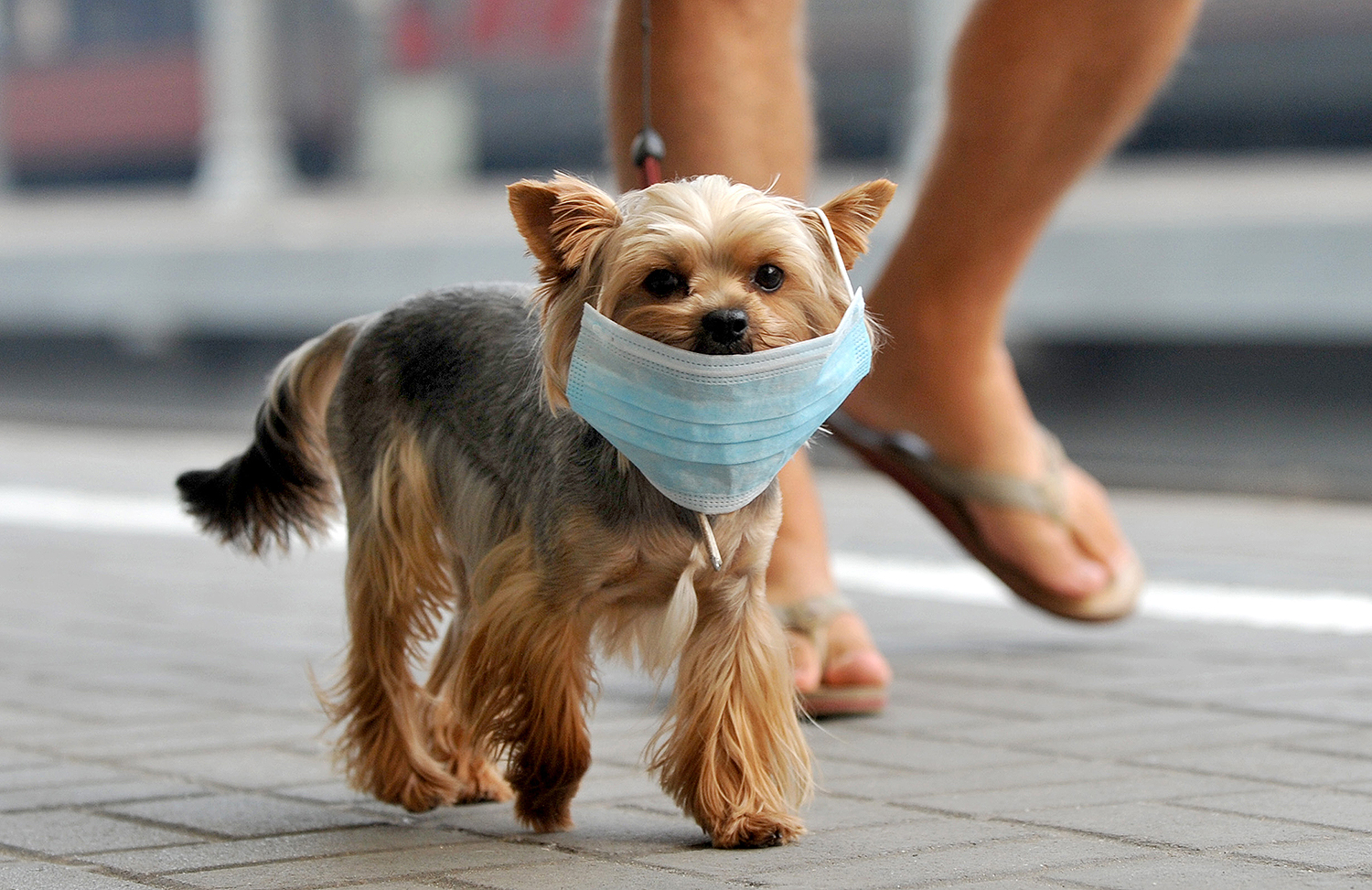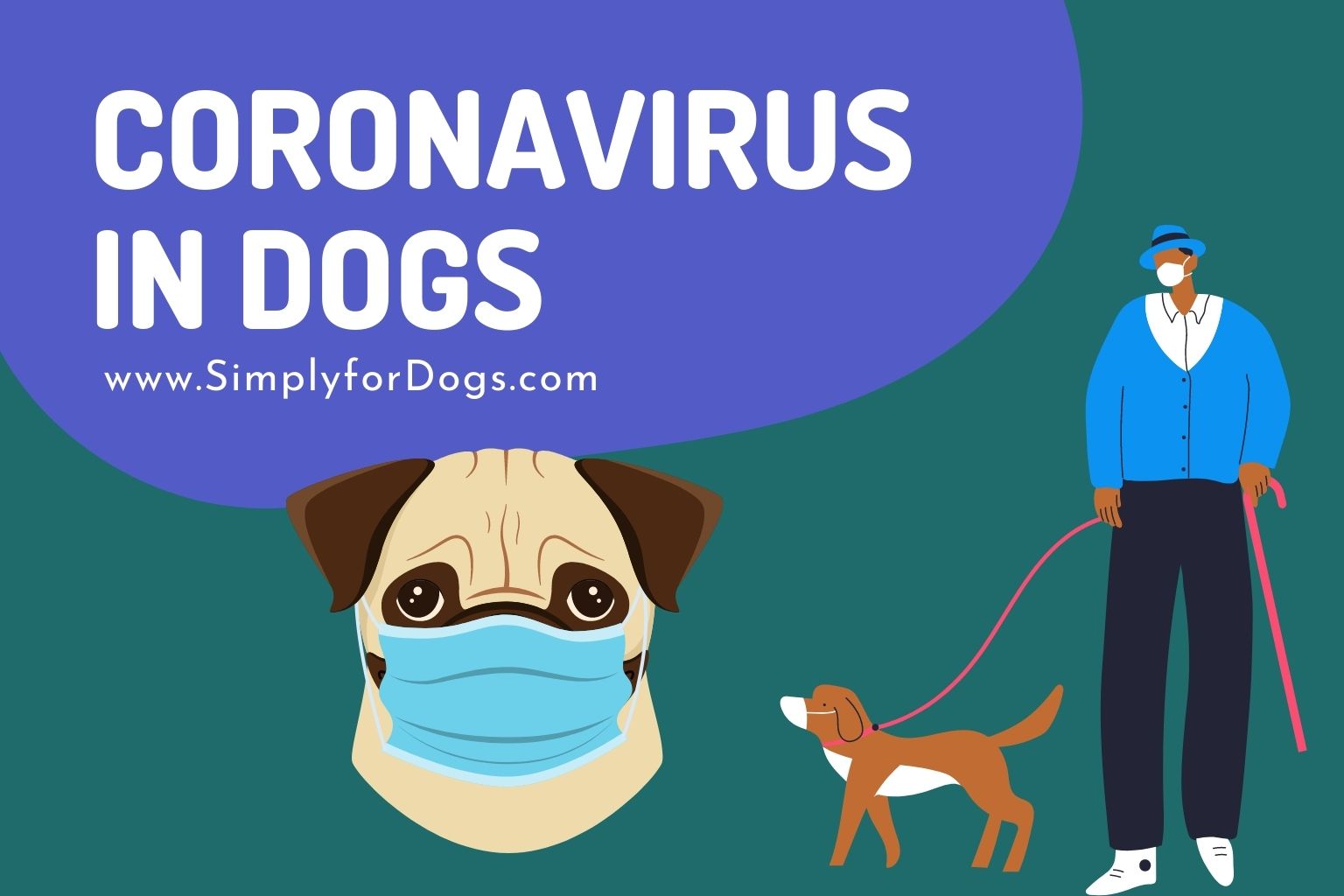It often seems as though every time you turn around, you’re hearing about another horrible epidemic that’s going to wipe all of humankind off the face of the planet. As of this writing (February 2020), the plague everyone is talking about is a coronavirus. Years ago, it was SARS, bird flu and H1N1. None of them proved to be “extinction events.” Whether coronavirus proves to be the one that will do us all in remains to be seen, but in the meantime, dog owners have been wondering how it might affect our canine friends. Accordingly, this post is about coronavirus in dogs.
Coronavirus in Dogs Overview
In humans, coronavirus causes pneumonia. In people with a suppressed immune system, pneumonia can be fatal. But what is canine coronavirus? In dogs, coronavirus typically manifests a bit differently, affecting the intestinal tract. This is sometimes referred to as enteric coronavirus. There is also a respiratory variety of canine coronavirus but it’s less common. We’ll talk about that later on.
Coronavirus in dogs is usually not all that serious, and it’s short-lived. It can, however, cause a lot of gastric discomfort for affected dogs. Remember the last time you ate that gas station sushi, or the sub you left in the fridge for a week but figured “Hey, it still looks okay and I’m pretty sure that’s not mold”? That’s how your dog feels when he’s suffering from canine coronavirus.
Why is it called coronavirus? It’s because if you were to actually look at the virus through an electron microscope, you’d see something that looks like a crown comprised of ornaments fixed on a ring. Like many viruses, coronavirus is actually kind of pretty!
Is it deadly, though? When contracted by a dog, coronavirus is only dangerous if the dog is otherwise in ill health, or otherwise vulnerable. The dogs that are likely to have the most difficulty fighting off canine coronavirus are puppies and seniors. Keep reading to learn more about how canine coronavirus could affect your dog.
Coronavirus in Dogs Vaccine
As is the case with many illnesses that can affect dogs, coronavirus in dogs can be prevented using a readily available vaccine. It’s worth mentioning, though, that it might not be appropriate for all dogs. Your veterinarian is your best source of information when it comes to deciding whether you should vaccinate your dog against canine coronavirus.
Coronavirus Symptoms in Dogs
What are the signs of coronavirus in dogs? Usually, they don’t look like a big deal. Your dog might have diarrhea, but then, what dog has never had a case of “the runs” over the course of his life? Most of the time, diarrhea isn’t a biggie, but if it’s accompanied by a decreased appetite and lethargy, and if the stool has an orange appearance, you should suspect canine coronavirus.
In other posts, I’ve mentioned the importance of having your dog vaccinated against canine parvovirus – a virus that is pretty much invariably deadly when it comes to puppies, and also better than 90% lethal in adult dogs. The thing here that’s really nasty is that sometimes parvovirus is confused with coronavirus, and the danger is that a dog with parvo might not get the treatment he needs. Also, parvo and coronavirus sometimes occur at the same time. If that happens, then the chances of your dog dying are pretty good.
Having your dog vaccinated against canine parvovirus isn’t just a matter of protection against that particular disease. It’s also a way for your veterinarian to eliminate parvo if your dog shows up at the animal hospital exhibiting gastric distress and to proceed immediately to treatment for canine coronavirus.
I’m not trying to scare you here – there can be any number of reasons why your dog might develop diarrhea. It could be parvo, it could be coronavirus, or it could be just that he ate something that disagreed with him. If the “shit fest” doesn’t stop with 24 hours, though, it could be canine coronavirus or something more serious, and a trip to the vet is warranted.
Coronavirus in Dogs Treatment
Are you wondering how to treat coronavirus in dogs? Good luck with that, because there actually isn’t any treatment. Once the coronavirus takes hold in dogs, you just have to wait for it to run its course. My mother used to have an aphorism for just about anything, and her take on coronavirus in dogs would have been “An ounce of prevention is worth a pound of cure.” So with canine coronavirus, there is no real treatment other than doing things to ease the gastric discomfort. There is, however, prevention in the form of the vaccine.
Cause of Coronavirus in Dogs
What is the cause of coronavirus in dogs? Most of the time, dogs get coronavirus by eating poop. They can also get it from eating out of dirty food bowls, or by being in contact with another dog that has the virus.
Related Content:
9 Facts About Canine Parvo and the Parvo Vaccine
Rabies in Dogs: Causes, Symptoms, Diagnosis, Treatments and Prevention (Video)
The Facts About Warts on Puppies and Dogs (Video)
Coronavirus Infection in Dogs
The coronavirus in dogs is an infection. In other words, something that is transmitted. So what causes coronavirus infection in dogs? It’s usually a matter of unsanitary conditions and crowding. That’s why coronavirus in dogs is so prevalent in puppy mills. Crowding and unsanitary conditions favor transmission.” The scary thing is, a dog can carry the coronavirus for up to six months after being infected.

Respiratory Coronavirus in Dogs
Respiratory coronavirus in dogs is a whole different thing from enteric coronavirus. This is a virus that causes respiratory infection, and in that it’s similar to the coronavirus that humans are worried about right now.
This type of canine coronavirus is, thankfully, rare, but when it does present it can cause respiratory failure – in other words, the dog suffocates to death. It’s not all that common, but it does occur where dogs are kept in close quarters – in other words, puppy mills, but also shelters and boarding kennels. It can affect dogs of age and breed. It’s transmitted dog-to-dog by means of sneezing, coughing, and also by means of contaminated surfaces like kennel floors, leashes, collars, water and food bowls, and even the hands of people who might handle the dogs.
The worst thing about respiratory coronavirus in dogs is that there is no vaccine. Treatment is supportive – in other words, you do your best, with antibiotics if there’s a secondary bacterial infection (viruses don’t respond to antibiotics) and use of a vaporizer to ease breathing. If your dog contracts respiratory coronavirus, he will likely be in a lot of discomforts for several weeks.
If your dog contracts respiratory coronavirus, you’re going to have to think of the other animals in your household, as this disease can be spread to other dogs, and to cats as well. It’s also not really known how long the disease can live, but it’s generally believed that it could be many hours.
Can Coronavirus in Dogs Spread to Humans?
There are diseases that dogs can transmit to humans. Coronavirus isn’t one of them. The most common dog-to-human diseases are as follows:
Campylobacteriosis – This is a disease that is transmitted via contaminated food or stool. People who are affected will develop abdominal distress.
Tapeworm – This is a parasite that spreads by ingesting fleas, and that presents as rice-like bugs in the stool. It doesn’t often cause a lot of distress to humans, but in cases of severe infestation, it can cause weight loss and infections.
Hookworm – You can pick up hookworms by walking in your bare feet, or encountering round that’s infected with hookworms. Usually, you won’t need medical treatment – the worms will die within a few weeks.
Rabies – This is a biggie, but fortunately pretty rare. Assuming that your dog has had his rabies shots, it’s highly unlikely you’ll ever have to worry about this. If your dog has contracted rabies, though, and you’ve come in contact with his saliva, you will develop symptoms including anxiety, delirium, fever, and weakness. And then you will die. Please, have your dog vaccinated against rabies.
That’s it for common illnesses. There are less common diseases, like ehrlichiosis, giardiasis, leishmaniasis and Lyme disease, but these are so uncommon that it’s not even really worth worrying about. Generally speaking, if you keep your dog inoculated against the most prevalent diseases, you won’t have to worry about anything.
Common Questions
How common is coronavirus in dogs?
Not very. It’s actually a very rare disease.
How is coronavirus spread in dogs?
Usually by eating poo.
Is coronavirus common in dogs?
It’s not all that common, but can be prevalent in puppy mills. Usually, coronavirus is spread in dirty conditions.
Can coronavirus in dogs spread to humans?
No. Coronavirus is not passed from dogs to humans.
Does coronavirus in adult dogs lead to diarrhea?
Yes, much of the time.
What are the symptoms of coronavirus in dogs?
Basically, they’re gonna crap all over the place!
How do you diagnose coronavirus in dogs?
You don’t. That’s your veterinarian’s job.
Is coronavirus common in dogs?
It’s actually a lot more common than you might think. It’s very common in puppies, particularly those that are raised in substandard conditions.
Conclusion
If you’re worried about the coronavirus when it comes to your dog, you can probably pull back and regroup. It’s not a biggie. Of course, any disease is cause for concern, but the coronavirus isn’t likely to take your dog out of the equation. It’s just another thing to think about, but not something to obsess over. All you really need to do is keep your dog’s regular shots up to date, and see your veterinarian from time to time. Coronavirus is just another thing that comes down the pipe from time to time, and it’s probably not a big deal. Look after your dog the way you always do and don’t let the media scare the living daylights out of you.
Related Content:
9 Facts About Canine Parvo and the Parvo Vaccine
Rabies in Dogs: Causes, Symptoms, Diagnosis, Treatments and Prevention (Video)
The Facts About Warts on Puppies and Dogs (Video)
Sources:-
https://vcahospitals.com/know-your-pet/coronavirus-disease-in-dogs
https://www.sciencedirect.com/topics/veterinary-science-and-veterinary-medicine/canine-coronavirus
https://simplyfordogs.com/puppy-mills/5-reasons-puppy-mills-must-stopped/
https://www.avma.org/resources/pet-owners/petcare/canine-respiratory-coronavirus-faq

